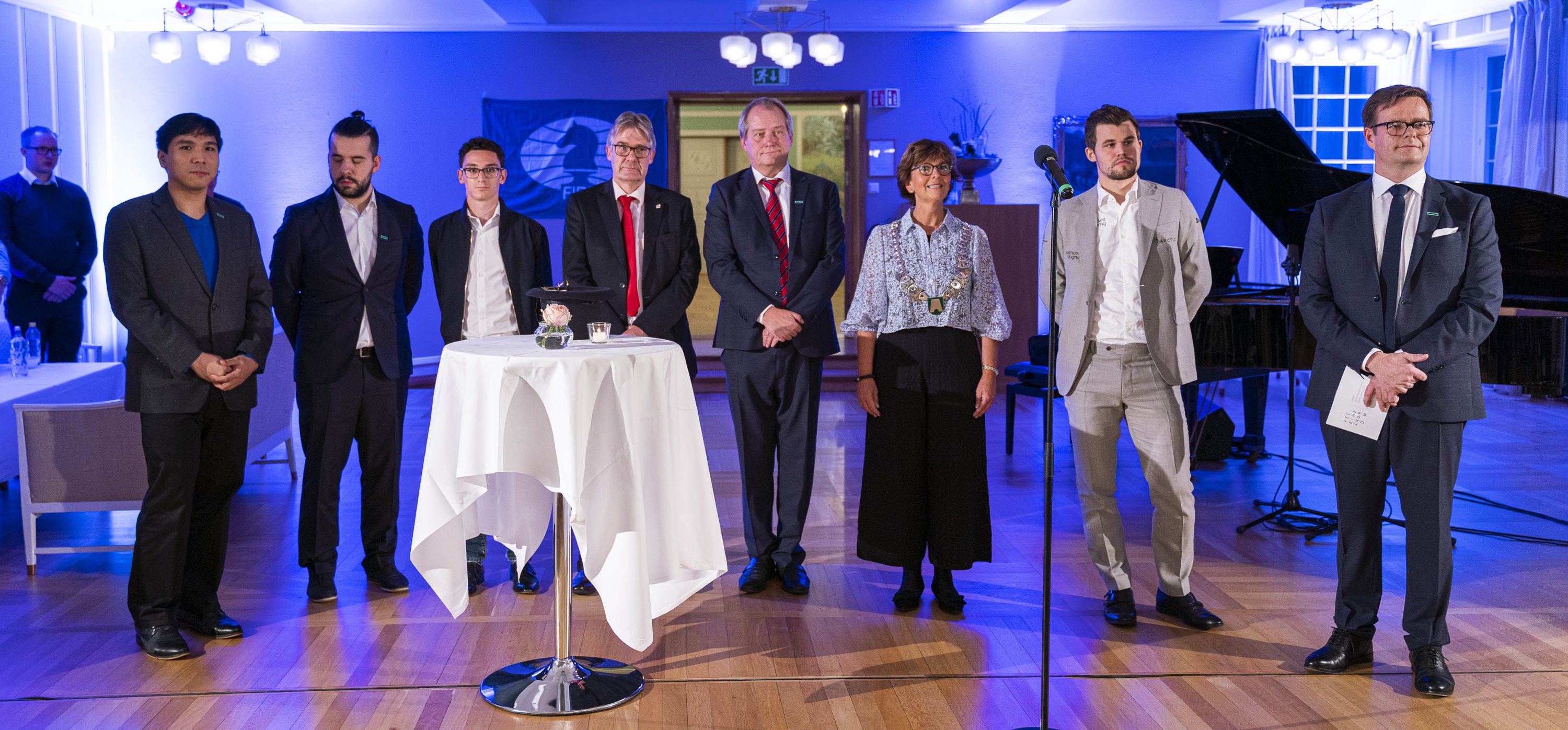After a long process of online qualifications, the action goes live and over-the-board in the first official FIDE World Fischer Random Chess Championship. The four semifinalists have gathered in Norway, and will face off at the Henie Onstad Art Center in Hovikodden, just outside the capital of Oslo.
The FIDE World Fischer Random Chess Championship begins October 27th at 17:00 CET, 9 a.m. Pacific, and can be watched live at www.Chess.com/TV and www.Twitch.tv/Chess.

The Opening Ceremony took place at Bærum City hall on Saturday October 26, co-hosted by the Mayor. The final four are American GMs Fabiano Caruana and Wesley So, Russian Ian Nepomniachtchi, and classical chess world champion and local hero Magnus Carlsen - who is arguably defending the unofficial Fischer Random title he won in a challenge duel with American FR specialist Hikaru Nakamura here last year.

The semifinals will be contested over three days: The first two days will see two slow rapid games each, with wins being worth three points. The final day features four fast rapid games worth a maximum of two points each, four blitz games worth one point each, and an Armageddon climax in the event of a tie. The finals will follow the same format.

During the opening ceremony, pairings for the semifinals were determined via drawing of lots and the world championship-contending players likely won't be happy about having to face each other before the final stage. Indeed, we will see a rematch of the 2018 World Chess Championship as Carlsen will start with white during slow rapid against Caruana who is in good form recently across multiple time controls.
In the other semifinal match, the enigmatic Nepomniachtchi will play with the white pieces against the ever-dangerous So as they clash for the first time in Fischer Random chess after waltzing through their respective knockout qualifier brackets.

What can we expect to see from a top flight Fischer Random showdown? First of all, from the caliber of the qualifiers, we can surmise that there is a very high correlation between classical skill and Fischer Random ability.
Throughout the knockout stages of the event, a clear pattern emerged - the top seeds were a very safe bet indeed to emerge from their respective side of the brackets to clash in the final. In an interview for the event, Nepomniachtchi had a simple explanation for his own success at the variant: "The secret comes down to my ability of not being bad at chess."

That seems to be conclusion number one as we gather Fischer Random experience - despite the relatively eye-popping start positions, the game is very much still just chess, and often surprisingly similar in the course of action. But surely there are also big differences?
The most compelling attraction of Fischer Random is the erasure of the curse of encyclopedic, computer enhanced opening preparation. The players are more or less completely on their own immediately. Last year's Nakamura-Carlsen match made it clear that the combatants felt reasonably content if they had an idea about what their first two moves would be.

Each starting position has different weak spots, or quick ways to mount unusual pressure. These novel dangers have to be assessed at once, otherwise an early crisis can occur.
The impact this tends to have on the game is that you see a completely inverted use of clock time compared to classical elite chess; players think longer, deeper and harder from the very beginning, and the tempo picks up as the game develops, and often transforms into much more familiar patterns.
This also explains why Fischer Random games can look like advanced 'chess' middlegames in what one would ordinarily consider to be the opening stage - the pieces may start out strangely, but they can find themselves on outposts that would take a long time to reach from the standard start position.

Of course, sometimes a Fischer Random game looks permanently odd, and nothing distinguishes it from classical chess like castling, which often looks a lot more like teleportation. When things don't normalize, it helps to combine chess skills with a sense of glee, and appreciation of the differences. The champ seems to have this quality.
What can we expect from the players? There haven't been enough games to come to deep conclusions, but viewers may have noted some emerging styles in the semifinalists' play. One person who has a declared philosophy is recent classical title challenger Fabiano Caruana.

Carlsen noted his rival's love of central control in classical chess, and Caruana has admitted that he believes in applying this basic principle just as strongly to Fischer Random, and you will see him trying to establish a firm grip on the core squares of the board. As he puts it, this variant is still so much like chess that its importance should still apply.

A look at the games on display in the earlier stages is probably the best way to warm up for the action. Player trademarks will still be visible - Nepomniachtchi is speedy and sharp, So remarkably harmonious and logical, Caruana centered and direct, Carlsen determined and versatile. Stay tuned for the action!
The FIDE World Fischer Random Chess Championship begins October 27th at 17:00 CET, 9 a.m. Pacific, and can be watched live at www.Chess.com/TV and www.Twitch.tv/Chess.